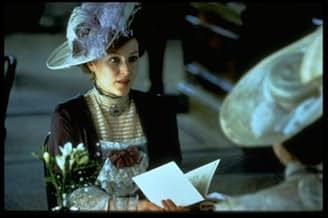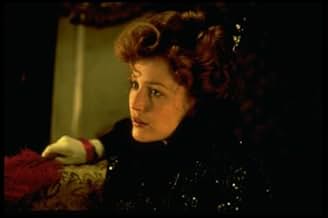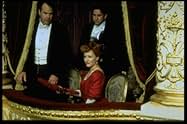IMDb-BEWERTUNG
7,0/10
8416
IHRE BEWERTUNG
Füge eine Handlung in deiner Sprache hinzuA woman risks losing her chance of happiness with the only man she has ever loved.A woman risks losing her chance of happiness with the only man she has ever loved.A woman risks losing her chance of happiness with the only man she has ever loved.
- Regie
- Drehbuch
- Hauptbesetzung
- Nominiert für 2 BAFTA Awards
- 6 Gewinne & 29 Nominierungen insgesamt
Anthony LaPaglia
- Sim Rosedale
- (as Anthony Lapaglia)
Mary MacLeod
- Mrs. Haffen
- (as Mary Macleod)
Empfohlene Bewertungen
The book is a masterpiece and this adaptation is almost up to that level, just as richly told and emotional. It is not the kind of adaptation that will suck people in straightaway but the slow pace and how subtle a lot of aspects are actually add to the storytelling rather than distract and shouldn't be reasons to dismiss it. While I can understand completely why not everybody will like The House of Mirth some of how the detractors express their opinion reek of ignorance, like with the I'm-right-you're-wrong attitude. The House of Mirth does have a slow start and Eric Stoltz's performance can seem rather lightweight for such a complex character, though he is not without his affecting moments. The casting does have the "is this going to work" thought initially but the performances come across really well. Laura Linney sinks her teeth into her role and is suitably bitter, Eleanor Bron is formidable, Dan Aykroyd also comes across surprisingly well in a menacing and cunning turn and Jodhi May is charming and sympathetic. Terry Kinney, Anthony LaPaglia, Penny Downie and Elizabeth McGovern are also very good. The best of the lot is Gillian Anderson, whose performance is magnetic and truly heartfelt, her last scene with Stoltz is just heart-wrenching. The House of Mirth is shot very elegantly and the whole adaptation's period detail looks gorgeous. The lack of music is a good choice, allowing the intimate, understated atmosphere of the storytelling speak for itself. The dialogue is distinctively Edwardian and very literate without being stilted, how it's adapted is very thoughtfully done and any observations of the attitudes and classes of the time are sharply done. The story takes its time to unfold which is not a bad thing, period dramas often benefit from this especially when it's adapted from complex source material, and thankfully this deliberate pacing is not done in a self-indulgent way. Narratively The House of Mirth is incredibly touching and rich in theme and character, allowing you to identify with the characters(written and characterised believably) and with the interactions and the emotion it always maintained my interest. The direction is very intelligent and subtle. All in all, a truly beautiful adaptation. 9/10 Bethany Cox
10mikeeoo
This is my favorite of all the Wharton novels adapted for the screen. The precision and depth with which the director and actors go is absolutely true to the novel in almost every respect.
Gillian Anderson is a revalation here, she perfectly captures the repression and pain of being a woman stuck in that time and place with no way out. You can feel her pain and torment in every quivering close up, and the passion contained in her kissing scenes (or to be more precise, her NON kissing- kissing scene) with Eric Stoltz is something to behold.
Eric Stoltz is equally amazing in one of the most complex and difficult roles for a man to play. I must disagree with the viewer from China, Mr. Seldon is NOT meant to be terribly "masculine" or "deep voiced" or "unbearably handsome"- those are modern readings that perhaps we expect from the role of the 'male hero' in modern films- but here Mr. Selden is written exactly as he is played- walking a fine line between what is correct behaviour for the time, and what he was or wasn't allowed to do in regards to her rescue. He is torn by love of Lilly Bart and the realization that he is not the right man for her, as the all important social scene would frown on their union. The actor portrays this ambiguity perfectly, and I for one found it a relief that the man didn't ride in and save the day in that cliched movie way.
I also must commend the supporting players of Anthony LaPaglia (whose role "Sim Rosedale" is originally written as a Jewish man, one of the few changes made to the n script adaption of the novel) and Laura Linney as Bertha Dorset, the 'bad girl' of the story. They both bring a life to the story that is rare to see in a period film, most actors seem to be too afraid or respectful of the material to really bring it to life.
I even enjoyed Dan Ackyroyd in a role that I didn't see him in or expect to like him in. I suppose my feelings about him are coloured by old Saturday Night Live shows, or Driving Miss Daisy, but I think he was terrific in a role that is not the most explored in the novel or the film.
Everything about this film held my interest and moved me, and I'm a very tough audience as far as Wharton goes. The pacing is indeed slow, but if you give yourself over to it it is like taking a warm bath in a quick shower world.
Very well done!
Gillian Anderson is a revalation here, she perfectly captures the repression and pain of being a woman stuck in that time and place with no way out. You can feel her pain and torment in every quivering close up, and the passion contained in her kissing scenes (or to be more precise, her NON kissing- kissing scene) with Eric Stoltz is something to behold.
Eric Stoltz is equally amazing in one of the most complex and difficult roles for a man to play. I must disagree with the viewer from China, Mr. Seldon is NOT meant to be terribly "masculine" or "deep voiced" or "unbearably handsome"- those are modern readings that perhaps we expect from the role of the 'male hero' in modern films- but here Mr. Selden is written exactly as he is played- walking a fine line between what is correct behaviour for the time, and what he was or wasn't allowed to do in regards to her rescue. He is torn by love of Lilly Bart and the realization that he is not the right man for her, as the all important social scene would frown on their union. The actor portrays this ambiguity perfectly, and I for one found it a relief that the man didn't ride in and save the day in that cliched movie way.
I also must commend the supporting players of Anthony LaPaglia (whose role "Sim Rosedale" is originally written as a Jewish man, one of the few changes made to the n script adaption of the novel) and Laura Linney as Bertha Dorset, the 'bad girl' of the story. They both bring a life to the story that is rare to see in a period film, most actors seem to be too afraid or respectful of the material to really bring it to life.
I even enjoyed Dan Ackyroyd in a role that I didn't see him in or expect to like him in. I suppose my feelings about him are coloured by old Saturday Night Live shows, or Driving Miss Daisy, but I think he was terrific in a role that is not the most explored in the novel or the film.
Everything about this film held my interest and moved me, and I'm a very tough audience as far as Wharton goes. The pacing is indeed slow, but if you give yourself over to it it is like taking a warm bath in a quick shower world.
Very well done!
This is a slow paced mesmerising film. If your only knowledge of Gillian Anderson is as Dana Scully in the X-Files then you are in for a big surprise. Firstly the lady can act, and secondly with great subtlety. If you have read the book then clearly the writer/director Terence Davies has taken a few liberties. But so much script has been lifted word for word from the novel that I think he can be forgiven any eccentricities. This is a story of manners in early twentieth century New York and environs. Everyone seems so decent and 'proper', but each plays their own manipulative game. No-one (with the exception of Sim Rosedale) tells the truth. As a morality tale it seems as relevant today as when Edith Wharton wrote it. Davies has succeeded in losing none of its mood or punch by transferring it to screen. Unfortunately I think this is a film that requires watching more than once as some explanatory scenes appear to have ended up on the cutting room floor. Generally the acting is excellent throughout though I felt that at times Davies's enthusiasm for detail hamstrung some actors where others appeared to have relished the close direction. This is a film to add to your personal collection.
Along with Scorsese's, The Age of Innocence and Iain Softley's, The Wings of the Dove, Terence Davies' The House of Mirth forms a triumvirate of modern period drama for a discerning audience. Davies is not interested chiefly in either scenery or costume - that is, in history as a heritage theme-park - but in the story, its themes and characters, and in teasing out good performances from his cast. The modest budget of this film works in its favour. Most of the best scenes and shots are framed in intimacy, not lost amidst panoramas of superficial grandeur or the shallow aesthetics of Merchant-Ivory-style film making.
At the heart of Davies' film is Gillian Anderson's brilliant performance as Lilly Bart. Since she is on screen almost all of the time the film really stands or falls by her performance. She sheds her "X-Files" persona in moments and conveys an enormous range of subtle emotions as her character vacillates between an almost involuntary avarice and moral scruples, foolishness, charm, fortune and tragedy. The affect of Anderson's performance is lasting and deep. Indeed, this film lives on long in the memory and continued to trouble me for weeks after I had seen it.
At the heart of Davies' film is Gillian Anderson's brilliant performance as Lilly Bart. Since she is on screen almost all of the time the film really stands or falls by her performance. She sheds her "X-Files" persona in moments and conveys an enormous range of subtle emotions as her character vacillates between an almost involuntary avarice and moral scruples, foolishness, charm, fortune and tragedy. The affect of Anderson's performance is lasting and deep. Indeed, this film lives on long in the memory and continued to trouble me for weeks after I had seen it.
I'm not sure how this movie could get a bad review. Of course, there are those people who find its pace too slow. However, one must realize that this is a period drama; it's not meant to be an action-packed suspense thriller. Everything is subtle, but it is so beautifully prepared, thought out, and executed by all.
1. Were it for nothing else, the technical aspects of this film would have kept me watching until the very end. The music was perfectly placed to rise and fall with the internal emotions of the characters - especially Lily and Lawrence - and to express the turmoil of the social downfall of Lily. On top of that, you have phenomenal costumes and set with the most lavish colors. Lastly, and possibly what I found most fascinating about the film, was the lighting. it always seemed just bright enough or just dark enough to reflect the romance or dreariness. In addition, there is just not denying that the way the light fell upon Gillian Anderson in every, single scene is something I have never seen before.
2. The all-star cast! Gillian Anderson. Eric Stolz. Laura Linney. Anthony LaPaglia. Dan Akroyd. Do I have to go on? I can almost guarantee that you'll find yourself, at one point or another, yelling at the screen. These characters are so manipulative and deceitful and malicious. And Lily is so naive and just won't accept love when it's given!! I think the best thing about the cast and performances in this film is that watching the film and listening to it are 2 completely opposite experiences. The actors convey one thing with their faces and another with their voices; it's pure talent. I was amazed.
3. If nothing else, this film should watched purely for Gillian Anderson. This project was so different than her 'X Files' persona - and such a success, at that. The way she uses her eyes to express 5 different emotions in a matter of seconds blew me away. Her acting and utter vulnerability was awe-inspiring.
1. Were it for nothing else, the technical aspects of this film would have kept me watching until the very end. The music was perfectly placed to rise and fall with the internal emotions of the characters - especially Lily and Lawrence - and to express the turmoil of the social downfall of Lily. On top of that, you have phenomenal costumes and set with the most lavish colors. Lastly, and possibly what I found most fascinating about the film, was the lighting. it always seemed just bright enough or just dark enough to reflect the romance or dreariness. In addition, there is just not denying that the way the light fell upon Gillian Anderson in every, single scene is something I have never seen before.
2. The all-star cast! Gillian Anderson. Eric Stolz. Laura Linney. Anthony LaPaglia. Dan Akroyd. Do I have to go on? I can almost guarantee that you'll find yourself, at one point or another, yelling at the screen. These characters are so manipulative and deceitful and malicious. And Lily is so naive and just won't accept love when it's given!! I think the best thing about the cast and performances in this film is that watching the film and listening to it are 2 completely opposite experiences. The actors convey one thing with their faces and another with their voices; it's pure talent. I was amazed.
3. If nothing else, this film should watched purely for Gillian Anderson. This project was so different than her 'X Files' persona - and such a success, at that. The way she uses her eyes to express 5 different emotions in a matter of seconds blew me away. Her acting and utter vulnerability was awe-inspiring.
Wusstest du schon
- WissenswertesEdith Wharton named the source novel after a passage from Ecclesiastes 7:4, "The heart of the wise is in the house of mourning; but the heart of fools is in the house of mirth."
- PatzerThe film, which takes place during 1905-07, depicts several characters attending a performance of the opera "Cosi fan tutte" -- but that opera was first performed in New York in 1922.
- Crazy CreditsThanks to the staff of Kelvingrove Museum, the Lord Provost and staff at Glasgow City Chambers, residents of Kersland Street, all the staff at the Arthouse Hotel, Glasgow, and the Earls of Wemyss and March and Lady Wemyss.
- SoundtracksOboe Concerto in D Minor: Slow Movement
Composed by Alessandro Marcello
Performed by Ferenc Erkel Chamber Orchestra
Courtesy of Naxos Recordings
Top-Auswahl
Melde dich zum Bewerten an und greife auf die Watchlist für personalisierte Empfehlungen zu.
- How long is The House of Mirth?Powered by Alexa
Details
- Erscheinungsdatum
- Herkunftsländer
- Sprachen
- Auch bekannt als
- La casa de la alegría
- Drehorte
- Produktionsfirmen
- Weitere beteiligte Unternehmen bei IMDbPro anzeigen
Box Office
- Budget
- 10.000.000 $ (geschätzt)
- Bruttoertrag in den USA und Kanada
- 3.043.284 $
- Eröffnungswochenende in den USA und in Kanada
- 48.770 $
- 25. Dez. 2000
- Weltweiter Bruttoertrag
- 5.164.404 $
- Laufzeit
- 2 Std. 15 Min.(135 min)
- Farbe
- Sound-Mix
- Seitenverhältnis
- 2.35 : 1
Zu dieser Seite beitragen
Bearbeitung vorschlagen oder fehlenden Inhalt hinzufügen



































